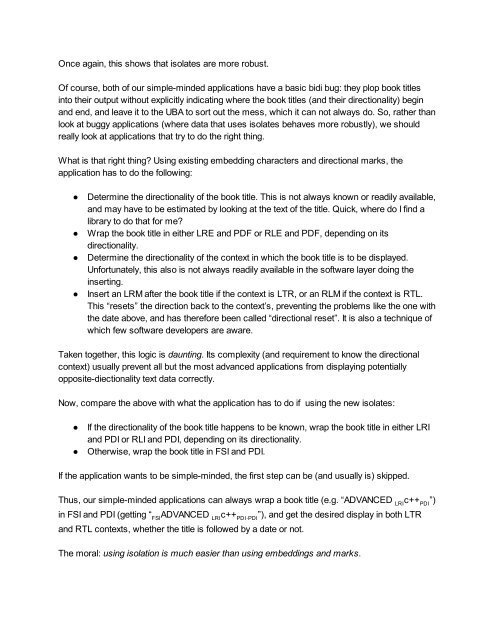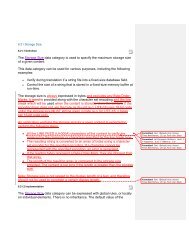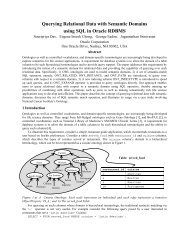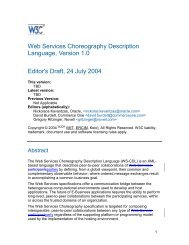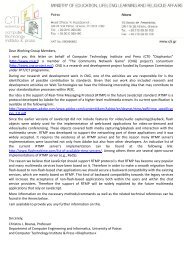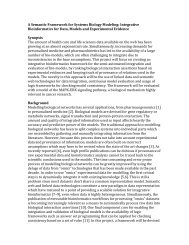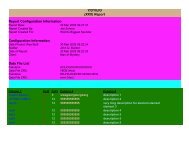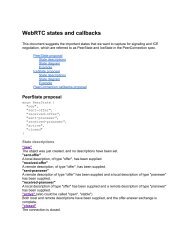A Proposal for Bidi Isolates in Unicode
A Proposal for Bidi Isolates in Unicode
A Proposal for Bidi Isolates in Unicode
You also want an ePaper? Increase the reach of your titles
YUMPU automatically turns print PDFs into web optimized ePapers that Google loves.
Once aga<strong>in</strong>, this shows that isolates are more robust.<br />
Of course, both of our simple-m<strong>in</strong>ded applications have a basic bidi bug: they plop book titles<br />
<strong>in</strong>to their output without explicitly <strong>in</strong>dicat<strong>in</strong>g where the book titles (and their directionality) beg<strong>in</strong><br />
and end, and leave it to the UBA to sort out the mess, which it can not always do. So, rather than<br />
look at buggy applications (where data that uses isolates behaves more robustly), we should<br />
really look at applications that try to do the right th<strong>in</strong>g.<br />
What is that right th<strong>in</strong>g? Us<strong>in</strong>g exist<strong>in</strong>g embedd<strong>in</strong>g characters and directional marks, the<br />
application has to do the follow<strong>in</strong>g:<br />
●<br />
●<br />
●<br />
●<br />
Determ<strong>in</strong>e the directionality of the book title. This is not always known or readily available,<br />
and may have to be estimated by look<strong>in</strong>g at the text of the title. Quick, where do I f<strong>in</strong>d a<br />
library to do that <strong>for</strong> me?<br />
Wrap the book title <strong>in</strong> either LRE and PDF or RLE and PDF, depend<strong>in</strong>g on its<br />
directionality.<br />
Determ<strong>in</strong>e the directionality of the context <strong>in</strong> which the book title is to be displayed.<br />
Un<strong>for</strong>tunately, this also is not always readily available <strong>in</strong> the software layer do<strong>in</strong>g the<br />
<strong>in</strong>sert<strong>in</strong>g.<br />
Insert an LRM after the book title if the context is LTR, or an RLM if the context is RTL.<br />
This “resets” the direction back to the context’s, prevent<strong>in</strong>g the problems like the one with<br />
the date above, and has there<strong>for</strong>e been called “directional reset”. It is also a technique of<br />
which few software developers are aware.<br />
Taken together, this logic is daunt<strong>in</strong>g. Its complexity (and requirement to know the directional<br />
context) usually prevent all but the most advanced applications from display<strong>in</strong>g potentially<br />
opposite-diectionality text data correctly.<br />
Now, compare the above with what the application has to do if us<strong>in</strong>g the new isolates:<br />
●<br />
●<br />
If the directionality of the book title happens to be known, wrap the book title <strong>in</strong> either LRI<br />
and PDI or RLI and PDI, depend<strong>in</strong>g on its directionality.<br />
Otherwise, wrap the book title <strong>in</strong> FSI and PDI.<br />
If the application wants to be simple-m<strong>in</strong>ded, the first step can be (and usually is) skipped.<br />
Thus, our simple-m<strong>in</strong>ded applications can always wrap a book title (e.g. “ADVANCED LRI<br />
c++ PDI<br />
”)<br />
<strong>in</strong> FSI and PDI (gett<strong>in</strong>g “ FSI<br />
ADVANCED LRI<br />
c++ PDI‧PDI<br />
”), and get the desired display <strong>in</strong> both LTR<br />
and RTL contexts, whether the title is followed by a date or not.<br />
The moral: us<strong>in</strong>g isolation is much easier than us<strong>in</strong>g embedd<strong>in</strong>gs and marks.


